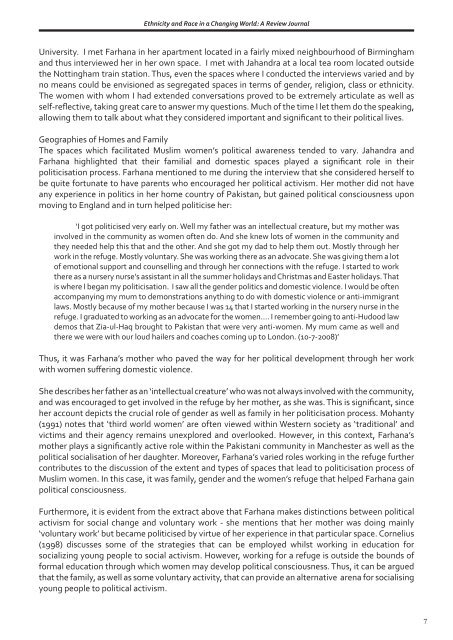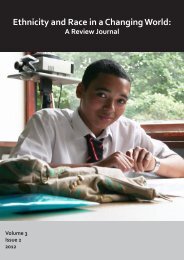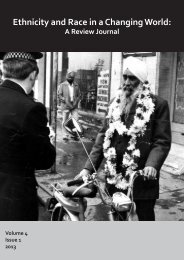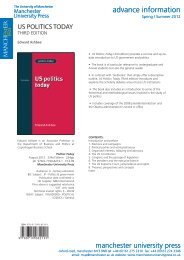Ethnicity and Race in a Changing World
Volume 2, Issue 1, 2010 - Manchester University Press
Volume 2, Issue 1, 2010 - Manchester University Press
- No tags were found...
You also want an ePaper? Increase the reach of your titles
YUMPU automatically turns print PDFs into web optimized ePapers that Google loves.
<strong>Ethnicity</strong> <strong>and</strong> <strong>Race</strong> <strong>in</strong> a Chang<strong>in</strong>g <strong>World</strong>: A Review JournalUniversity. I met Farhana <strong>in</strong> her apartment located <strong>in</strong> a fairly mixed neighbourhood of Birm<strong>in</strong>gham<strong>and</strong> thus <strong>in</strong>terviewed her <strong>in</strong> her own space. I met with Jah<strong>and</strong>ra at a local tea room located outsidethe Nott<strong>in</strong>gham tra<strong>in</strong> station. Thus, even the spaces where I conducted the <strong>in</strong>terviews varied <strong>and</strong> byno means could be envisioned as segregated spaces <strong>in</strong> terms of gender, religion, class or ethnicity.The women with whom I had extended conversations proved to be extremely articulate as well asself-reflective, tak<strong>in</strong>g great care to answer my questions. Much of the time I let them do the speak<strong>in</strong>g,allow<strong>in</strong>g them to talk about what they considered important <strong>and</strong> significant to their political lives.Geographies of Homes <strong>and</strong> FamilyThe spaces which facilitated Muslim women’s political awareness tended to vary. Jah<strong>and</strong>ra <strong>and</strong>Farhana highlighted that their familial <strong>and</strong> domestic spaces played a significant role <strong>in</strong> theirpoliticisation process. Farhana mentioned to me dur<strong>in</strong>g the <strong>in</strong>terview that she considered herself tobe quite fortunate to have parents who encouraged her political activism. Her mother did not haveany experience <strong>in</strong> politics <strong>in</strong> her home country of Pakistan, but ga<strong>in</strong>ed political consciousness uponmov<strong>in</strong>g to Engl<strong>and</strong> <strong>and</strong> <strong>in</strong> turn helped politicise her:‘I got politicised very early on. Well my father was an <strong>in</strong>tellectual creature, but my mother was<strong>in</strong>volved <strong>in</strong> the community as women often do. And she knew lots of women <strong>in</strong> the community <strong>and</strong>they needed help this that <strong>and</strong> the other. And she got my dad to help them out. Mostly through herwork <strong>in</strong> the refuge. Mostly voluntary. She was work<strong>in</strong>g there as an advocate. She was giv<strong>in</strong>g them a lotof emotional support <strong>and</strong> counsell<strong>in</strong>g <strong>and</strong> through her connections with the refuge. I started to workthere as a nursery nurse’s assistant <strong>in</strong> all the summer holidays <strong>and</strong> Christmas <strong>and</strong> Easter holidays. Thatis where I began my politicisation. I saw all the gender politics <strong>and</strong> domestic violence. I would be oftenaccompany<strong>in</strong>g my mum to demonstrations anyth<strong>in</strong>g to do with domestic violence or anti-immigrantlaws. Mostly because of my mother because I was 14 that I started work<strong>in</strong>g <strong>in</strong> the nursery nurse <strong>in</strong> therefuge. I graduated to work<strong>in</strong>g as an advocate for the women.… I remember go<strong>in</strong>g to anti-Hudood lawdemos that Zia-ul-Haq brought to Pakistan that were very anti-women. My mum came as well <strong>and</strong>there we were with our loud hailers <strong>and</strong> coaches com<strong>in</strong>g up to London. (10-7-2008)’Thus, it was Farhana’s mother who paved the way for her political development through her workwith women suffer<strong>in</strong>g domestic violence.She describes her father as an ‘<strong>in</strong>tellectual creature’ who was not always <strong>in</strong>volved with the community,<strong>and</strong> was encouraged to get <strong>in</strong>volved <strong>in</strong> the refuge by her mother, as she was. This is significant, s<strong>in</strong>ceher account depicts the crucial role of gender as well as family <strong>in</strong> her politicisation process. Mohanty(1991) notes that ‘third world women’ are often viewed with<strong>in</strong> Western society as ‘traditional’ <strong>and</strong>victims <strong>and</strong> their agency rema<strong>in</strong>s unexplored <strong>and</strong> overlooked. However, <strong>in</strong> this context, Farhana’smother plays a significantly active role with<strong>in</strong> the Pakistani community <strong>in</strong> Manchester as well as thepolitical socialisation of her daughter. Moreover, Farhana’s varied roles work<strong>in</strong>g <strong>in</strong> the refuge furthercontributes to the discussion of the extent <strong>and</strong> types of spaces that lead to politicisation process ofMuslim women. In this case, it was family, gender <strong>and</strong> the women’s refuge that helped Farhana ga<strong>in</strong>political consciousness.Furthermore, it is evident from the extract above that Farhana makes dist<strong>in</strong>ctions between politicalactivism for social change <strong>and</strong> voluntary work - she mentions that her mother was do<strong>in</strong>g ma<strong>in</strong>ly‘voluntary work’ but became politicised by virtue of her experience <strong>in</strong> that particular space. Cornelius(1998) discusses some of the strategies that can be employed whilst work<strong>in</strong>g <strong>in</strong> education forsocializ<strong>in</strong>g young people to social activism. However, work<strong>in</strong>g for a refuge is outside the bounds offormal education through which women may develop political consciousness. Thus, it can be arguedthat the family, as well as some voluntary activity, that can provide an alternative arena for socialis<strong>in</strong>gyoung people to political activism.7






